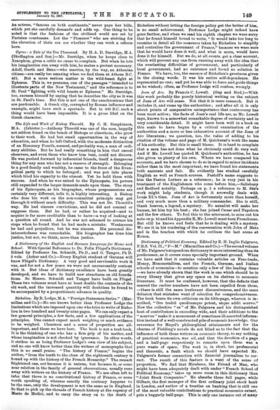Richelieu. By R. Lodge, M.A. "Foreign Statesmen Series." (Mac- millan
and Co.)—No one knows better than Professor Lodge the limitations which are imposed upon one who tries to write of Riche- lieu in two hundred and twenty-nine pages. We can only expect a few general principles, a few facts, and a few applications of the principles. One cannot expect much weighing or much evidence to be weighed. Clearness and a sense of proportion are all- important, and these we have here. The book is not a text-book. It is the thinking of one who has a firm grip of his matter, and whose imagination is not checked by ignorance. In other words, it strikes us as being Professor Lodge's own view of his subject, and no one will know better than the writers of monographs that this is no small praise. "The history of France," begins the author, "from the tenth to the close of the eighteenth century is bound up with the history of the French Monarchy." The remark frightened one, not because it is untrue, but because it, or some near relation in the family of general observations, usually runs away with writers on the history of France. We are often left to infer that there is no constitutional history of France, or none worth speaking of, whereas exactly the contrary happens to be the case, only the development is not the same as in England. So that to pick up the threads of French history at the regency of Marie de Medici, and to carry the story on to the death of
Richelieu without letting the foreign policy get the better of him, is no small achievement. Professor Lodge might indeed have gone farther, and when we read his eighth chapter we were sorry that he found himself bound to write, "It would take too long to examine in detail all the measures taken by Richelieu to simplify and centralise the government of France," because we were sure that he would have done it well, and what is more, would have done it for himself. But we do, at all events, get a clear account, which will prevent any one from running away with the idea that the everlasting difficulties of government, and particularly of local government, had no existence and found no solution in France. We have, too, the essence of Richelieu's greatness given in the closing words. It was his entire self-dependence. He represented no one; and yet he was able to force and guide things as he wished; often, as Professor Lodge will confess, wrongly.


















































 Previous page
Previous page